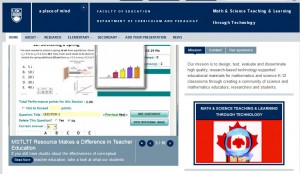We are very happy that our project – Mathematics and Science Teaching and Learning Through Technology had been funded for another year by UBC Teaching and Learning Enhancement Fund.
 We are very happy that our project – Mathematics and Science Teaching and Learning Through Technology had been funded for another year by UBC Teaching and Learning Enhancement Fund. During the first year of the project we have designed and implemented a database of resources for using electronic resource systems in the mathematics and science classrooms. We have more than 500 conceptual mathematics and science questions so far. Most of them focus on secondary curriculum, so we are going to add more elementary and middle school resources this year. We also want to focus on designing lessons for SMART Boards, as more and more schools in BC have SMART Boards and we hope to have more resources for mathematics and science teachers to help them get started.
We are very happy that our project – Mathematics and Science Teaching and Learning Through Technology had been funded for another year by UBC Teaching and Learning Enhancement Fund. During the first year of the project we have designed and implemented a database of resources for using electronic resource systems in the mathematics and science classrooms. We have more than 500 conceptual mathematics and science questions so far. Most of them focus on secondary curriculum, so we are going to add more elementary and middle school resources this year. We also want to focus on designing lessons for SMART Boards, as more and more schools in BC have SMART Boards and we hope to have more resources for mathematics and science teachers to help them get started.
We are also happy to see that more and more teacher-candidates and UBC and mathematics and science teachers use our resource. Our philosophy is to help teachers, but not to impose our resources on them. Thus all our resources are easily modifiable – we upload PowerPoint documents that teachers can change to fit their teaching philosophy. We hope that more people will be using our resources.
Here is selected feedback we received from student-teachers, students and teachers from Lower Mainland who have been using our resource:
“I liked these questions and would like to see more of these in class. Questions like these make you think and personally I can’t understand physics without thinking about the principles I learn in class” (Secondayr Student 1). “The questions challenged me and really made me think, it was more than just plugging in numbers” (Secondary Student 2). “The question with the free falling target was a very good question. It really got me thinking about it. It was confusing to begin with, but then when it was explained, it made more sense” (Secondary Student 3). “As a teacher, I think they are very valuable resources because they are engaging, they address common misconceptions, they can generate great class discussions promoting critical thinking and they motivate students to carry out further practical work to confirm predictions.”
Teacher-candidates who have used clicker-oriented resources in their methods courses have contributed widely to the project by letting us know what resources they find the most useful and why, how the resources can be improved and how they were able to use these resources during their School Practicum. For example, these are a few comments from our teacher-candidates: “I have found the conceptual clicker questions from your classroom to be probably the most useful and illuminating part of my classes. This format provides an environment in which the class feels comfortable investigating and exposing their [teacher-candidates’] misconceptions and beliefs about physics” (Student-Teacher 1). “The use of conceptual questions and clickers is very engaging and intellectually stimulating. The clickers create a safe learning environment where students do not have to fear giving an incorrect response to the teacher. I look forward to using this in my future classroom” (Student-Teacher 2). “I feel that the use of clickers in classroom can keep a student anonymous. It reduces stress among students due to embarrassment of failure, and at the same time it helps instructor assess the success of the teaching strategies. Whereas, if they are simply asked if they have any questions or understood the concept, they might just nod without any understanding. It can give false expression of their understanding, mitigating their learning potential” (Student-Teacher 3). “I would like to give you a big thank you for all your resources! They came in very handy and I actually used quite a few. I also did the conceptual questions and laminated ABCDEF squares handed them out and tried it. It worked very well!” (Student-Teacher 4 referring to using a low-tech version of clickers during her short school Practicum).
